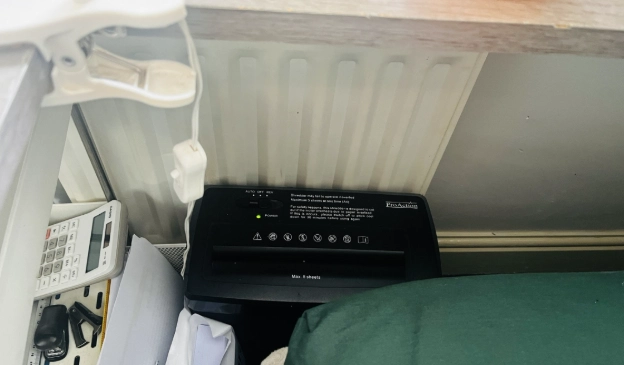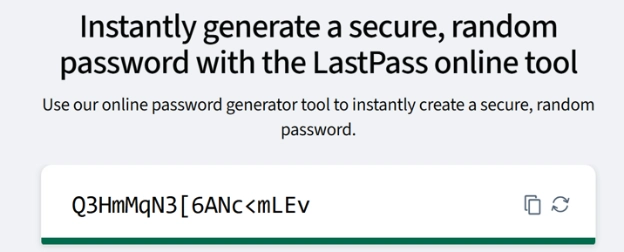Password Security for Virtual Assistants: Keep Your Business Safe

-
Password Security for Virtual Assistants: Keep Your Business Safe
- Password Security Tips: Why I Use LastPass for My Business
- Free Password Generator: How I Use LastPass to Stay Secure
- Shredder for Home Office: Protecting Client Data
- Dropbox: Offsite Backup Solutions for Small Business Security
- UK GDPR: Data Security for Small Business
- Registering with the ICO: Data Protection for Virtual Assistants
- Public Wi-Fi Risks: Why You Need a Secure Internet Connection
- Things to Know About Using a Mobile Hotspot
- Final Thoughts
- FAQs
Disclosure: Some of the links in this article may be affiliate links, which can provide compensation to me at no cost to you if you decide to purchase. This site is not intended to provide financial advice and is for entertainment only.
Password Security for Virtual Assistants: Keep Your Business Safe
As a Virtual Assistant, your role goes far beyond admin support, part of your virtual assistant job responsibilities is protecting sensitive client data. From emails and invoices to passwords and project files, your clients are trusting you to keep their information safe. If you don’t take password security seriously, you risk losing that trust and damaging your business.
When I first started my VA business back in 2011, small business security wasn’t something I thought about much. I kept client logins in a “password protected” Excel file. Then GDPR came in and everything changed. Scammers have only got smarter and while tech and AI bring amazing opportunities, they also mean we must keep evolving to stay secure.
That’s why I’ve pulled together what I use for password security and backups as part of my virtual assistant skills toolkit. In this blog you’ll find advice and tutorials that will help you protect both your business and your clients. These are the exact changes I’ve made over the years to stay compliant with data protection laws and to build a more professional, resilient business.
By the end, you’ll have a clear plan for tightening up your own security and the confidence that your VA business is secure.
Password Security Tips: Why I Use LastPass for My Business
Weak or reused passwords are one of the biggest risks in small business security today. In fact, more than 80% of data breaches are caused by poor passwords and 61% of hacked passwords are less than eight characters long (source).
Writing passwords in a notebook, saving them in an Excel file, or worse, reusing the same login everywhere isn’t secure. A lost notebook, a cracked file, or one leaked password could give criminals access to everything in one swoop.
That’s why I use LastPass, a password vault for business that stores all my logins safely in one place. With just one strong master password, I can securely access hundreds of client passwords and my own, without relying on outdated storage methods. It’s one of the essential virtual assistant skills and tools I recommend and I also highlighted it in my blog, Top 10 Virtual Assistant Tools (Free + Paid), because it’s made such a difference in my day-to-day work.
If you want to see it in action, this video is a great place to start. Watch How To Use LastPass Password Manager 2025 (LastPass Tutorial) here.
And if you need a reminder of what not to do, take a look at this Daily Mail article. A government agency once left passwords written on Post-It notes stuck to a computer and the photo ended up in the national news for everyone to see. It might look amusing at first, but it’s also a serious reminder that password security matters.
Free Password Generator: How I Use LastPass to Stay Secure
Ever wondered how people come up with those long, complex logins full of random letters, numbers and symbols? I don’t make them up myself, I use the free password generator from LastPass. With one click, it creates strong, unique logins that hackers can’t easily guess or crack. I don’t need to remember them. LastPass saves the details automatically when I set up a new account for a new program and all I need to recall is my single master password to unlock everything in my password vault in LastPass.
Try it here: LastPass Password Generator
Image description: Screenshot of the LastPass free password generator creating a strong random password with letters, numbers and symbols.
If you think one weak password doesn’t matter, think again. In 2023, a 158-year-old company was destroyed because of a single compromised login, 700 staff, systems offline, all due to bad habits like reused passwords and no backup plan. You can read more about that story (and why password security tips are essential) in this LinkedIn post by Martyn Boyle from CloudyIT. The graphic in Martyn’s blog really drives the point home.
As Virtual Assistants, protecting client information is part of our core virtual assistant job responsibilities. Strong virtual assistant skills don’t just cover admin and organisation, they include understanding small business security and using the right tools to keep client data safe. With LastPass, you can secure everything, give your clients peace of mind and make your own life easier too.
Shredder for Home Office: Protecting Client Data
Even in today’s digital world, paper still builds up. Client notes, printed invoices, or my own calculations for client finances, all of it can contain sensitive information that should never go straight in the bin. Just think how protective you are over your own email address or bank details. You wouldn’t throw those away for anyone to find, so the same applies to client data. Proper disposal is a vital part of small business security and maintaining trust.
You don’t need to rush out and buy a shredder the moment you start your VA business, but as your workload grows and you begin handling more client documents, you’ll quickly realise a shredder for home office use becomes essential.
For years I’ve relied on a basic Pro Action model that handles five sheets at a time and even shreds staples, which is a huge time saver. The reverse function is handy too if you overload it. The only drawback is it overheats during heavy use, so big clear-outs take longer, but it’s lasted me many years without any problems.

Image description: This is my ProAction shredder, which fits neatly under my desk in a small, tight space out of the way. It’s an important part of small business security, helping me keep client data safe and confidential.
If I was buying again, I’d choose the Bonsaii 6 Sheet Cross Cut Paper Shredder. It’s ideal for Virtual Assistants who want to keep sensitive documents secure. It shreds staples, paperclips and even credit cards, making it one of the best shredders for home office and light business use.
Bonsaii 6 Sheet Cross Cut Paper Shredder on Amazon.
Having a reliable shredder isn’t optional in the long term, it’s part of protecting client information, meeting your virtual assistant job responsibilities and maintaining your professionalism as a VA.
Dropbox: Offsite Backup Solutions for Small Business Security
One of the best ways I protect my Virtual Assistant business is by backing everything up to Dropbox. If my computer ever failed, I know my files aren’t stuck on a dead hard drive, they’re safely stored in the cloud and ready for me to access from any device. For me, this makes Dropbox one of the best cloud storage for business options available.
When I first started out in 2011, I used external hard drives and even kept them in a fireproof box. That worked at the time, but technology has moved on and from a data protection point of view, offsite backup solutions are far more reliable. Dropbox handles this seamlessly, without slowing down my computer and it means I can keep working without interruption if the worst happens.
Several of my clients also use Dropbox and I’ve always found it the easiest platform to work with. I’ve tried OneDrive, but it slowed my PC down. I do use SharePoint with a couple of clients, though I had to get their IT team to set up a mapped drive just to make it practical and so I could access my files quickly instead of logging into SharePoint each time. A few clients prefer Google Drive, but for my own business Dropbox is still my go-to.
For the peace of mind it gives me, the cost is well worth it at £95.88 for the year. I’ve also written about Dropbox as one of my recommendations in Top 10 Virtual Assistant Tools (Free + Paid).
Now Watch: Dropbox Tutorial for Beginners – 2025 Update below.
UK GDPR: Data Security for Small Business
As a Virtual Assistant, it’s not just tools and software you need to think about, understanding your responsibilities under UK GDPR is essential. GDPR (General Data Protection Regulation) first came into force in May 2018 and still applies today in the UK, making it a core part of small business security.
In practice, this means you’re legally responsible for how you handle client data such as contact lists, emails, addresses and phone numbers. You must pay the annual ICO Data Protection Fee, report any data breaches within 72 hours and ensure people give clear consent for marketing with simple opt-out options.
If you already follow good data protection practices, you may not need to make huge changes, but it’s always worth reviewing how you collect, store and process data to stay compliant. For Virtual Assistants, this falls under your wider virtual assistant job responsibilities.
For further reading, the Society of Virtual Assistants has an excellent article on GDPR. Although it was written in 2017, the idea remains the same under UK GDPR. Read their guidance here.
Registering with the ICO: Data Protection for Virtual Assistants
As a UK Virtual Assistant, you must register with the ICO (Information Commissioner’s Office). Even if all you store is a client’s email address for invoicing, you are still responsible for keeping that data secure and handling it correctly. Registration currently costs around £40 a year (with a small discount if you pay by direct debit) and is a core part of small business security. It also shows clients you take data protection seriously, which is an essential part of your virtual assistant job responsibilities.
The ICO is also the organisation you must notify if you ever experience a major breach and this must be done within 72 hours to stay compliant with UK GDPR.
Read more from The Society of Virtual Assistants.
Register directly with the ICO here.
Public Wi-Fi Risks: Why You Need a Secure Internet Connection
It might be tempting to catch up on client work from a coffee shop, but logging into accounts that contain sensitive data over public Wi-Fi is a major security risk. Unsecured networks can be hacked easily, leaving your logins, client files and emails exposed without you even realising it. The safest option is to create a secure internet connection by using your phone as a hotspot or sticking to non-sensitive tasks when away from your home office.
A safer option is to use your phone as a mobile hotspot. This allows your laptop to connect through your 4G/5G data instead of the café’s open Wi-Fi. In practice, your phone acts like a mini Wi-Fi router and because it’s running on your own mobile network, you’re creating a much more secure internet connection.
If you do need to work away from your home office, stick to non-sensitive tasks on public Wi-Fi, or switch to a hotspot for anything that involves client data security.
If you’ve never used your phone as a personal hotspot, here’s how to set it up so you can create a secure internet connection for your laptop instead of relying on unsecured networks:
On iPhone
Go to Settings → Personal Hotspot.
Toggle on Allow Others to Join.
A Wi-Fi name (e.g. Bianca’s iPhone) and password will appear.
On your laptop, connect to that Wi-Fi network using the password shown.
On Android (Samsung, Google, etc.)
Go to Settings → Connections (or Network & Internet).
Tap Mobile Hotspot & Tethering.
Toggle on Mobile Hotspot.
A network name and password will appear.
On your laptop, connect to that Wi-Fi network with the password shown.
Image description: A woman using her laptop in a coffee shop, highlighting the risks of working on public Wi-Fi and the need for a secure internet connection. Photo by Joey Huang on Unsplash.
Things to Know About Using a Mobile Hotspot
It uses your mobile data allowance, so make sure you’ve got enough data in your plan.
Your phone battery drains faster when it’s acting as a hotspot, plug it in if possible.
The password can be changed if you want something easier to type.
Protecting client information isn’t just about strong passwords or backups, it’s also about creating a secure internet connection wherever you work. Avoiding unsecured networks and using a hotspot instead is a simple way to strengthen your overall client data security.
Final Thoughts
Data security isn’t optional when you’re running a Virtual Assistant business, it’s part of your core virtual assistant skills and responsibilities. From GDPR compliance and ICO registration to using secure tools like LastPass and Dropbox, every step you take builds trust with your clients and strengthens your small business security.
I’ve seen the industry change a lot since I started in 2011 and the truth is scammers and hackers are only getting smarter, but by putting the right practices and tools in place, you can stay ahead, protect your business and give your clients peace of mind.
If you’re ready to strengthen your own setup, start small: try LastPass for secure password management, invest in a shredder for home office use to safely dispose of client documents and use Dropbox as a reliable offsite backup solution. Each step makes your business stronger, more professional and more secure.
Now read: Best Free Images and Tools for Virtual Assistant Content
And read: How to Use ChatGPT as a Virtual Assistant
FAQs
To make this blog as useful as possible, I’ve included answers to some questions people search for about password security and small business security. These short Q&As are designed to give you quick, practical guidance.
Q: What is password security and why is it important for small business security?
A: Password security means using strong, unique logins instead of weak or reused ones. For small business security, it’s vital as one weak password can expose all your client data.
Q: What are virtual assistant job responsibilities around data security?
A: Virtual assistant job responsibilities include keeping client information safe. That means GDPR compliance, using a password vault for business and properly destroying sensitive files.
Q: What is an offsite backup solution and why should I use one?
A: An offsite backup solution like Dropbox stores your files in the cloud. If your computer fails, you can still access everything instantly and keep your VA business running.
-
Password Security for Virtual Assistants: Keep Your Business Safe
- Password Security Tips: Why I Use LastPass for My Business
- Free Password Generator: How I Use LastPass to Stay Secure
- Shredder for Home Office: Protecting Client Data
- Dropbox: Offsite Backup Solutions for Small Business Security
- UK GDPR: Data Security for Small Business
- Registering with the ICO: Data Protection for Virtual Assistants
- Public Wi-Fi Risks: Why You Need a Secure Internet Connection
- Things to Know About Using a Mobile Hotspot
- Final Thoughts
- FAQs
Disclosure: Some of the links in this article may be affiliate links, which can provide compensation to me at no cost to you if you decide to purchase. This site is not intended to provide financial advice and is for entertainment only.


